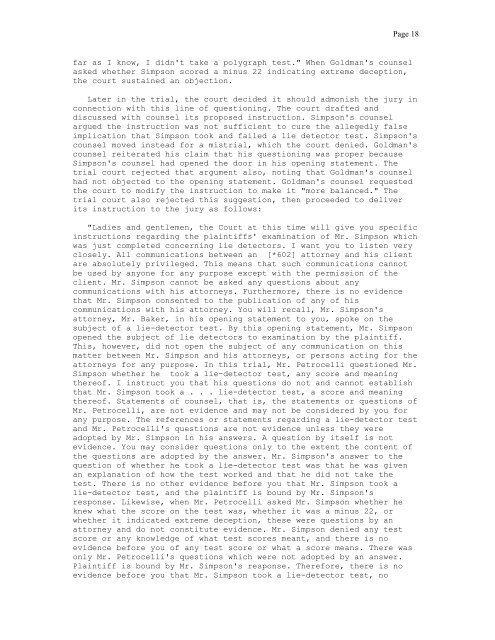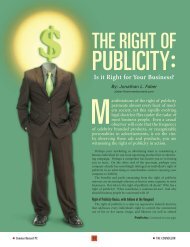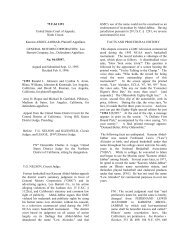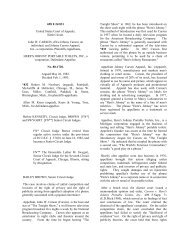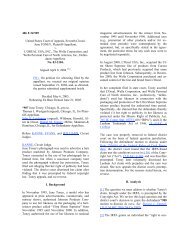Rufo v. OJ Simpson - Right Of Publicity
Rufo v. OJ Simpson - Right Of Publicity
Rufo v. OJ Simpson - Right Of Publicity
You also want an ePaper? Increase the reach of your titles
YUMPU automatically turns print PDFs into web optimized ePapers that Google loves.
Page 18<br />
far as I know, I didn't take a polygraph test." When Goldman's counsel<br />
asked whether <strong>Simpson</strong> scored a minus 22 indicating extreme deception,<br />
the court sustained an objection.<br />
Later in the trial, the court decided it should admonish the jury in<br />
connection with this line of questioning. The court drafted and<br />
discussed with counsel its proposed instruction. <strong>Simpson</strong>'s counsel<br />
argued the instruction was not sufficient to cure the allegedly false<br />
implication that <strong>Simpson</strong> took and failed a lie detector test. <strong>Simpson</strong>'s<br />
counsel moved instead for a mistrial, which the court denied. Goldman's<br />
counsel reiterated his claim that his questioning was proper because<br />
<strong>Simpson</strong>'s counsel had opened the door in his opening statement. The<br />
trial court rejected that argument also, noting that Goldman's counsel<br />
had not objected to the opening statement. Goldman's counsel requested<br />
the court to modify the instruction to make it "more balanced." The<br />
trial court also rejected this suggestion, then proceeded to deliver<br />
its instruction to the jury as follows:<br />
"Ladies and gentlemen, the Court at this time will give you specific<br />
instructions regarding the plaintiffs' examination of Mr. <strong>Simpson</strong> which<br />
was just completed concerning lie detectors. I want you to listen very<br />
closely. All communications between an [*602] attorney and his client<br />
are absolutely privileged. This means that such communications cannot<br />
be used by anyone for any purpose except with the permission of the<br />
client. Mr. <strong>Simpson</strong> cannot be asked any questions about any<br />
communications with his attorneys. Furthermore, there is no evidence<br />
that Mr. <strong>Simpson</strong> consented to the publication of any of his<br />
communications with his attorney. You will recall, Mr. <strong>Simpson</strong>'s<br />
attorney, Mr. Baker, in his opening statement to you, spoke on the<br />
subject of a lie-detector test. By this opening statement, Mr. <strong>Simpson</strong><br />
opened the subject of lie detectors to examination by the plaintiff.<br />
This, however, did not open the subject of any communication on this<br />
matter between Mr. <strong>Simpson</strong> and his attorneys, or persons acting for the<br />
attorneys for any purpose. In this trial, Mr. Petrocelli questioned Mr.<br />
<strong>Simpson</strong> whether he took a lie-detector test, any score and meaning<br />
thereof. I instruct you that his questions do not and cannot establish<br />
that Mr. <strong>Simpson</strong> took a . . . lie-detector test, a score and meaning<br />
thereof. Statements of counsel, that is, the statements or questions of<br />
Mr. Petrocelli, are not evidence and may not be considered by you for<br />
any purpose. The references or statements regarding a lie-detector test<br />
and Mr. Petrocelli's questions are not evidence unless they were<br />
adopted by Mr. <strong>Simpson</strong> in his answers. A question by itself is not<br />
evidence. You may consider questions only to the extent the content of<br />
the questions are adopted by the answer. Mr. <strong>Simpson</strong>'s answer to the<br />
question of whether he took a lie-detector test was that he was given<br />
an explanation of how the test worked and that he did not take the<br />
test. There is no other evidence before you that Mr. <strong>Simpson</strong> took a<br />
lie-detector test, and the plaintiff is bound by Mr. <strong>Simpson</strong>'s<br />
response. Likewise, when Mr. Petrocelli asked Mr. <strong>Simpson</strong> whether he<br />
knew what the score on the test was, whether it was a minus 22, or<br />
whether it indicated extreme deception, these were questions by an<br />
attorney and do not constitute evidence. Mr. <strong>Simpson</strong> denied any test<br />
score or any knowledge of what test scores meant, and there is no<br />
evidence before you of any test score or what a score means. There was<br />
only Mr. Petrocelli's questions which were not adopted by an answer.<br />
Plaintiff is bound by Mr. <strong>Simpson</strong>'s response. Therefore, there is no<br />
evidence before you that Mr. <strong>Simpson</strong> took a lie-detector test, no


